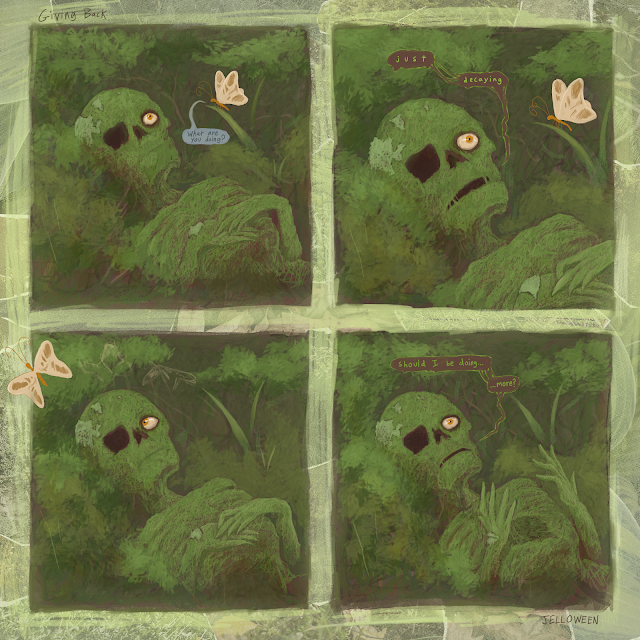 |
| "Giving Back" comic by Jelloween |
A lot of folks believe in the well-worn adage, "everything happens for a reason". But I can't subscribe to that, because it justifies every horror along with each happiness.
What should I be doing? What am I supposed to be doing?
These are infinitely confounding questions because there really isn't something that you're supposed to be doing, at least as far as the universe is concerned. You weren't put here for a mysterious purpose that it is incumbent upon you to figure out before you squander any chance at fulfilling your destiny. It's the people around you, and the society at large, that want you to be productive in particular ways that will enable you to be financially self-sufficient in the world we've created for ourselves. Yet it is the community which requires your fealty who leave you largely adrift in making that happen.
For at least 300,000 years — 98% of the time we've been on earth — humans led a paleolithic existence. It's only within very recent history that we've invented civilization and technologies that have dramatically changed the fundamental ways in which we live and function, and it's happened with such unnatural speed that we can't even evolve fast enough to keep up. This is one reason we're constantly in conflict with ourselves: we're adapting in real time to our present environment, which often runs counter to the ways we've developed over centuries. Our modern lives are rewiring our brains to expect and crave constant stimulation, to conform to strict schedules and erratic sleep patterns, unnatural diets and sedentary lifestyles, rigid protocols and rapidly changing social norms, and completely novel and abstract ways of thinking... while our bodies increasingly lag decades farther behind.
So what are we supposed to be doing with ourselves?
There are social obligations. There are personal ambitions. But there is no One Thing, one Ultimate Destiny for each of us to succeed or to fail at. Sometimes it feels like we're swimming against the tide and sometimes it feels like we're swimming with it, and when things seem to be working in our favor, it's easy to feel like we're doing something right; that we must have meandered fortuitously onto our intended path. But struggling against the tide doesn't necessarily mean mistakes have been made or the direction is wrong. It's just the world going its own way while you go another. The people and the pebbles, the roots and the stream, all have someplace to be, too.
When you work hard in the direction of some particular goal, with luck those efforts will gradually generate their own momentum, drawing things necessary for your success into your own current. Stumbling blocks and detours are the growing pains; just a part of the learning curve. Sometimes it's having to work against our own dispositions or the systems that we find ourselves tangled up in. Life is a wilderness; it's shadowy and chaotic to navigate, and sometimes the river's gonna carry you farther from, and sometimes closer to, your destination. But barriers are just brambles in the path, wending their own way to someplace else. They're not a formal judgement or final determination about what you're supposed to be doing. You're just an animal that came into existence by an astronomically unlikely string of circumstances, tracing all the way back to the beginning of the known universe, into a really fucking weird and difficult time to be human. Give yourself a break.
I sit here asking myself: what am I supposed to be doing? What are my next steps? Where am I going to and how do I get there? And I ask not in the conventional sense of moving from point A to point B in physical space, or meeting my immediate bodily needs. No, I demand knowledge of myself in the abstract; in existential terms. I am asking myself, who am I supposed to be, and how am I supposed to become them?
Yet the truth is, you are becoming yourself just as long as you're living. But that future image you've cultivated in your mind is the one that will haunt you, for good or ill. They are the angel you wrestle with. You are the angel, and you wrestle yourself. The self that has internalized the demands of society.
Everything doesn't happen for a reason. It's a wilderness. But that's why you're free. Life is a boat and it will arrive at its final shore whether or not you are paddling. Where along that shore you make landing is the piece that remains unknown. That shoreline is infinite, its possibilities as multitudinous as the stars. Whether you wind up on Wall Street or a cabin in the woods, you did what you needed to do. Which was to be you, alive and interfacing with the universe through your centuries-defined senses in this cosmically implausible moment.





